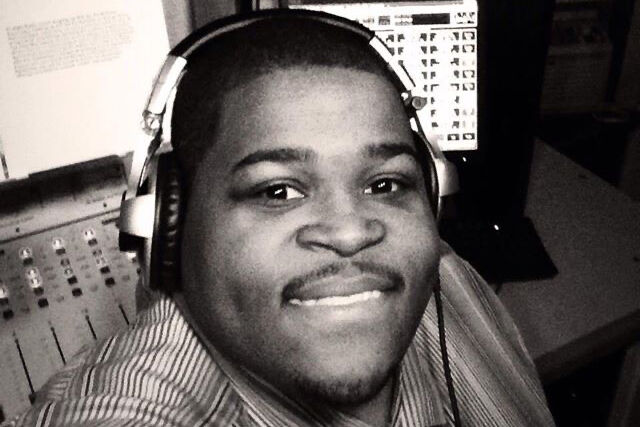
In the past month, NASCAR banned the Confederate Flag, Faith Hill urged its removal from the Mississippi flag, Lady Antebellum changed to Lady A and The Dixie Chicks changed to The Chicks to remove any association with slavery in the Antebellum South.
On Sunday night, Kane Brown became the first Black male solo country artist to perform at the BET Awards with his new song “Worldwide Beautiful” featuring the lyrics: “White churches, black churches, different people, same hearses. … We ain’t that different from each other , from one to another, I look around and see worldwide beautiful .”
These are all welcome developments to Black country music radio personality Mike Bryant, who grew up listening to the genre in Rockville, Maryland, before working at WMZQ and ultimately becoming an on-air personality at WFRE in Frederick.
“I’ve always enjoyed country music,” Bryant told WTOP. “You could tell that country wanted to be more inclusive in the open arms of how that scene just welcomed Darius [Rucker]. … With Lady A changing their name and The Dixie Chicks … there’s always a place for it, you’re just not sure how ready that scene is prepared to accept diversity.”
Bryant admits it’s a unique position being a Black voice on country radio.
“When I tell people that I’m on country radio, you get weird looks because all they see in the current state is not a lot of diversity,” Bryant said. “It’s a banner I’m proudly willing to carry in that you put those spotlights on those artists that … either you overlook or don’t realize that they’re there. I like it, I love it and I want more people to understand that.”
Anyone who watched Ken Burns’ documentary “Country Music” knows that the genre was founded on the blending of instruments from different cultures — banjo from Africa, mandolin from Italy, fiddle from Ireland — all creating a uniquely American sound.
As “hillbilly music” caught the ear of the recording industry, harmonica player DeFord Bailey became the first Black artist to perform at the Grand Ole Opry in 1927, while Ray Charles recorded a crossover country smash with “I Can’t Stop Loving You” in 1957.
“It’s always been there, it just sometimes gets lost in the mix, because people genuinely think that country music is left for one sect of people and that’s just not true,” Bryant said.
As with any genre, there’s no broad brush. There’s always been the good and the bad, the revolutionaries and the traditionalists, the forward thinkers and the backward thinkers. Just as there’s always been a Loretta Lynn (“The Pill”) to Tammy Wynette (“Stand By Your Man”) on women’s rights, country also has a mixed record on race.
Merle Haggard penned an undisputed masterpiece in “Mama Tried,” but also the inherently backward “Okie from Muskogee.” Likewise, David Allan Coe recorded the classic hit “The Ride,” but also the underground X-rated “N****r F****r.” Thankfully, it wasn’t played on actual country radio, but the sentiments bubbled under the surface.
Then along came country’s Jackie Robinson. Charley Pride shattered the color barrier with eight No. 1 hits from 1969-1971, including “Kiss an Angel Good Morning.” When Webb Pierce said, “It’s good to have you in our music,” Pride replied, “It’s my music, too.”
“My dad was a huge Charley Pride fan,” Bryant said. “He also liked Hank Williams.”
Throughout the ’70s, “Old Hippie” outlaw artists like Willie Nelson, Waylon Jennings, Kris Kristofferson and Johnny Cash pushed the genre with more socially conscious lyrics (“Man in Black,” “Sunday Morning Coming Down,” “Mammas Don’t Let Your Babies Grow Up to Be Cowboys”) that reflected the cultural revolution of the Baby Boomer generation.
At the same time, Alabama became arguably the greatest country group of all time, on the one hand flying a Confederate flag in the background, on the other praising FDR singing, “Mr. Roosevelt is gonna save us all. Song, song of the south, sweet potato pie and I shut my mouth. Gone, gone with the wind, ain’t nobody looking back again.”
The problem was that people were looking back, perhaps not even knowing the harm. Fans of Lynyrd Skynyrd and “Dukes of Hazzard” embraced the flag as a symbol of Southern pride without realizing that the line “In Birmingham they loved a governor” referred to Gov. George Wallace, who campaigned upon, “Segregation forever.”
By the ’80s, Hank Williams Jr. was country king, with anthems like “A Country Boy Can Survive,” which might contain a dog whistle referencing his buddy getting stabbed in New York City but is mostly just a celebration of skinning bucks and running trotlines — self-sufficient survival skills that would come in pretty darned handy during COVID, folks.
However, other Hank Jr. songs are downright cringeworthy in hindsight, like “If the South Woulda Won,” featuring the lyrics, “We wouldn’t have no killers gettin’ off free, if they were proven guilty, then they would swing quickly, instead of writin’ books and smilin’ on TV.” Who do you think he’s referring to? Sigh, the strains still hadn’t been stamped out.
Then, things started to change around the time Bryant and I were coming of age. He was born in 1981. I was born in 1984. We were both exposed to an evolving music landscape, hearing country music on the school bus, then hip-hop in the hallways. As the late Kenny Rogers sang, “The best golfer’s black, the best rapper’s white and it’s about damn time.”
“Understand that people like me love this music too and appreciate guys like Hank Williams Jr., Alan Jackson and Garth Brooks,” Bryant said. “When I wanted to get into radio … I wanted to represent those kids who live in different spaces …to know that country music is okay and that it’s awesome to enjoy even if you’re a person of color.”
In 1992, the same year Dolly Parton’s “I Will Always Love You” crossed over for Whitney Houston, Garth Brooks recorded “We Shall Be Free” in response to the Rodney King riots: “When we’re free to love anyone we choose, when this world’s big enough for all different views, when we all can worship from our own kind of pews, we shall be free.”
“It was very gutsy,” Bryant said. “There’s a city that is literally and figuratively on fire. … People of color feel like no one sees them. At that moment, Garth Brooks stepping out into the spotlight and going, ‘I see you. … Even if it loses me support, friends or people don’t buy my albums, this is what I’m going to do,’ you gotta respect a guy like that.”
In fact, Brooks refused to take the stage at the Super Bowl until they placed his “We Shall Be Free” music video. The NFL said they had to cut it due to time constraints, but Brooks stood firm backstage and called their bluff until they played the diverse video.
“Artists dream of playing the Super Bowl,” Bryant said. “He refused and he held that place hostage until they played that video so people could see it, because he knew that was a platform that millions and millions of people are going to watch. … The fact that he refused was awesome. It was such a great story and so awesome that he did it.”
By the new millennium, Big & Rich introduced Black country artist Cowboy Troy.
“Cowboy Troy is one of those guys mixed in that was popular at the time and just kind of fell by the wayside,” Bryant said. “He’s still there, he’s still representing country music, he still wants to push this genre forward. … He maybe wasn’t taken as seriously, but he is a serious country singer. He takes the genre very serious and he believes in that genre.”
In 2006, Kenny Chesney recorded “Some People Change,” covered by Montgomery Gentry: “His old man was a rebel yeller, bad boy to the bone. He’d say, ‘Can’t trust a colored feller.’ He’d judge ’em by the tone of their skin. … Then he saw the light, hit his knees, cried and said a prayer, rose up a brand new man, left the old one right there.”
In 2008, Brad Paisley wrote “Welcome to the Future” to honor the first black president: “I had a friend in school, a running back on the football team. They burned a cross in his front yard for asking out the homecoming queen. I thought about him today and everybody who’s seen what he’s seen, from a woman on a bus to a man with a dream.”
“Country music acknowledging the first black president was huge,” Bryant said. “To have someone like Brad Paisley do a song like that and go, ‘Hey, I acknowledge it, too’ … you go, ‘Alright man, this is cool. I can go with this.’ … It always makes me smile when country artists that are not people of color fight fiercely as much as a person of color.”
Since then, it has been one step forward, three steps backward in politics. What seemed like a once-in-a-century chance for healing — a half black, half white man elected president — was undone by the “birther” movement in an extremely divided nation.
Still, there’s hope in Darius Rucker, who transitioned from Hootie & The Blowfish to solo success. This paved the way for Kane Brown, Jimmie Allen, Yola, Rhiannon Giddens and Mickey Guyton, not to mention Lil Nas X with Billy Ray Cyrus (“Old Town Road”) and Nelly with Tim McGraw (“Over and Over Again”) and Florida Georgia Line (“Cruise”).
“Pay attention to guys like Jimmie Allen, a young kid named Willie Jones who is currently on the uptick, a guy like Breland,” Bryant said. “A lot of people believe that some people of color and the younger guys are trying to change it. … I want to say we’re not trying to change the core value, we’re just trying to get you to look at it in a different way.”
Bryant said he personally knows Allen, who grew up in nearby Delaware.
“With his first No. 1 hit ‘Best Shot’ becoming one of the first No. 1 hits off the debut album of a person of color, that says something, that means people are starting to realize there are people of color in this genre,” Bryant said. “He really loves this music. … He loves that culture. He loves how the people around him have been so loving and inclusive.”
In the end, it’s all about love. It’s an open-mindedness on display each time Kacey Musgraves urges listeners to, “Follow your arrow wherever it points,” every time Luke Bryan sings, “I believe you love who you love, ain’t nothing you should ever be ashamed of,” every time Lady A sings, “I run from hate, I run from prejudice, I run from pessimists.”
“There can be so much more in this world, there can be so much love if you just listen to the music,” Bryant said. “What they’re going through is the same as what [you’re] going through. … If people can just look past what their eyes see and use their hearts and their ears … it doesn’t matter what the color of their skin is, they love this genre.”







